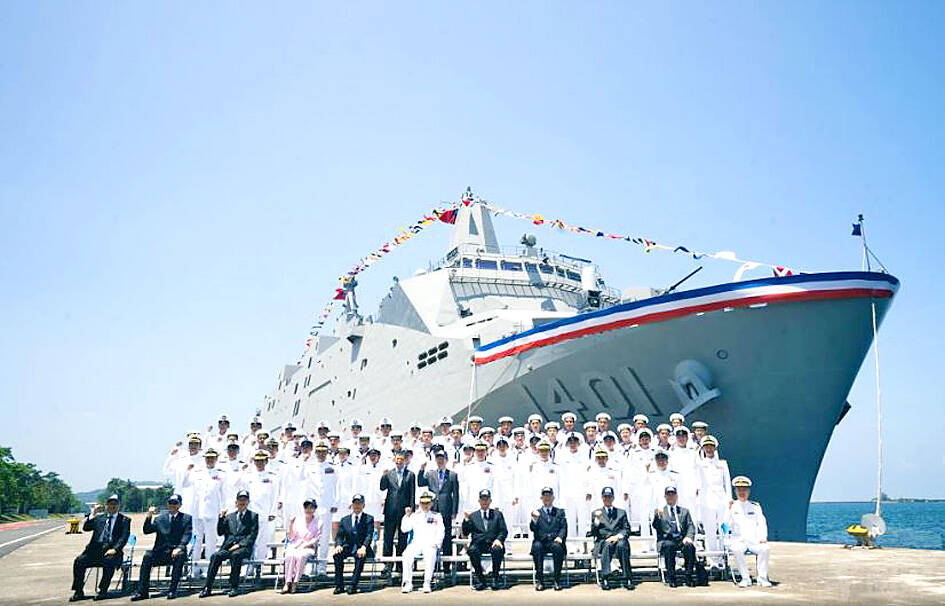Navy Commander Admiral Tang Hua (唐華) yesterday morning presided over the commissioning of a new domestically developed landing platform dock, the Yushan.
The Yushan, which would be used to transport amphibious vehicles and other landing craft, is replacing the Hsu Hai dock landing ship, which entered service in 1999.
Unlike during past commissioning ceremonies, yesterday’s was closed to the public and was only covered by the Military News Agency, which issued a news release afterward.

Photo: screen grab from Military News Agency’s Web site
Tang handed over the national flag and the ship’s seal to its first captain at the ceremony at Kaohsiung’s Zuoying (左營) naval base.
He said the Yushan was a “new type of amphibious combat ship” that was designed specifically to meet the navy’s evolving operational needs.
During construction, the Yushan went under the code name “Hongyun Project” (鴻運計畫), which referred to the safety and smoothness of the operation that engineers prioritized during the design process, Tang said.
The name Yushan was chosen as it is the name of the highest peak in Taiwan, and represents the “determination of the navy to always stand on the front line in defending the country and its territorial waters,” he said.
Officers from the Marine Corps also attended the ceremony, symbolizing the important role the ship would play in the operations of the navy and the Marine Corps, he said.
“The two branches of the military will jointly assume the responsibility of defending the Taiwan Strait, and together will form a maritime defense force,” he said. “The officers aboard the Yushan are to cooperate closely with the Marine Corps.”
The ship is 153m long and 23m wide, and has a full-load displacement of 10,600 tonnes and a top speed of more than 20 knots (37kph).
It has a loading dock at its stern, from which it can load amphibious armed personnel carriers and troops, and can also be equipped with autocannons and anti-aircraft missile systems.

Intelligence agents have recorded 510,000 instances of “controversial information” being spread online by the Chinese Communist Party (CCP) so far this year, the National Security Bureau (NSB) said in a report yesterday, as it warned of artificial intelligence (AI) being employed to generate destabilizing misinformation. The bureau submitted a written report to the Legislative Yuan in preparation for National Security Bureau Director-General Tsai Ming-yen’s (蔡明彥) appearance before the Foreign Affairs and National Defense Committee today. The CCP has been using cognitive warfare to divide Taiwanese society by commenting on controversial issues such as Taiwan Semiconductor Manufacturing Co’s (TSMC, 台積電) investments in the

INVESTIGATION: The case is the latest instance of a DPP figure being implicated in an espionage network accused of allegedly leaking information to Chinese intelligence Democratic Progressive Party (DPP) member Ho Jen-chieh (何仁傑) was detained and held incommunicado yesterday on suspicion of spying for China during his tenure as assistant to then-minister of foreign affairs Joseph Wu (吳釗燮). The Taipei District Prosecutors’ Office said Ho was implicated during its investigation into alleged spying activities by former Presidential Office consultant Wu Shang-yu (吳尚雨). Prosecutors said there is reason to believe Ho breached the National Security Act (國家安全法) by leaking classified Ministry of Foreign Affairs information to Chinese intelligence. Following interrogation, prosecutors petitioned the Taipei District Court to detain Ho, citing concerns over potential collusion or tampering of evidence. The

‘COMPREHENSIVE PLAN’: Lin Chia-lung said that the government was ready to talk about a variety of issues, including investment in and purchases from the US The National Stabilization Fund (NSF) yesterday announced that it would step in to staunch stock market losses for the ninth time in the nation’s history. An NSF board meeting, originally scheduled for Monday next week, was moved to yesterday after stocks plummeted in the wake of US President Donald Trump’s announcement of 32 percent tariffs on Taiwan on Wednesday last week. Board members voted to support the stock market with the NT$500 billion (US$15.15 billion) fund, with injections of funds to begin as soon as today. The NSF in 2000 injected NT$120 billion to stabilize stocks, the most ever. The lowest amount it

NEGOTIATIONS: Taiwan has good relations with Washington and the outlook for the negotiations looks promising, Minister of Economic Affairs J.W. Kuo said Taiwan’s GDP growth this year is expected to decrease by 0.43 to 1.61 percentage points due to the effects of US tariffs, National Development Council (NDC) Minister Paul Liu (劉鏡清) said at a meeting of the legislature’s Economics Committee in Taipei yesterday, citing a preliminary estimate by a private research institution. Taiwan’s economy would be significantly affected by the 32 percent “reciprocal” tariffs slapped by the US, which took effect yesterday, Liu said, adding that GDP growth could fall below 3 percent and potentially even dip below 2 percent to 1.53 percent this year. The council has commissioned another institution